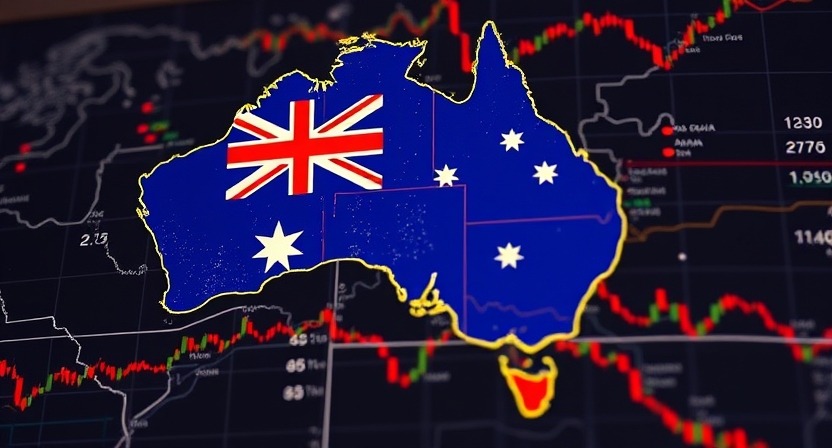The Australian stock market is an integral part of the global financial system, influenced by a multitude of factors, including geopolitical developments. In recent times, ongoing geopolitical tensions have significantly impacted the performance of the Australian market. These events, often occurring thousands of kilometres away, ripple through the global economy, affecting energy prices, investor sentiment, and market volatility in Australia.
How Geopolitics Shapes Market Dynamics
Geopolitical events—such as wars, trade disputes, and diplomatic stand-offs—create uncertainty, which is one of the biggest challenges for financial markets. Investors often react quickly to news that could affect international trade, energy supplies, or the stability of global economies.
For Australia, a resource-rich nation with strong trade links, these reactions are amplified. The Australian stock market, particularly sectors like energy, mining, and financials, is closely tied to global economic shifts. Let’s explore how these dynamics play out.
The Ripple Effect of Global Tensions
Geopolitical events can disrupt supply chains, increase the cost of energy, and reduce consumer confidence. For example, conflicts in the Middle East or Eastern Europe can lead to disruptions in oil and gas supplies, causing prices to spike.
Australia, as a major exporter of resources like coal and liquefied natural gas (LNG), benefits from higher energy prices in the short term. Companies in the energy sector often see their stock prices rise during such times. However, prolonged tensions can lead to inflation, increased production costs, and reduced global demand, which eventually weigh on the broader market.
Energy Prices: A Double-Edged Sword
Energy is one of the most volatile sectors in the stock market. Geopolitical tensions often send shockwaves through this industry, impacting Australian companies and households alike.
- Rising Costs: When tensions disrupt energy supply chains, prices for oil, gas, and coal tend to increase. Australian companies exporting these resources may enjoy higher revenues, but domestic industries reliant on energy face higher costs.
- Stock Market Volatility: Energy companies’ shares can experience wild price swings, influencing market indices like the ASX 200. This volatility brings both potential gains and challenges for investors.
- Global Demand Shifts: If geopolitical tensions slow down major economies like China or the United States, Australian exports could take a hit, dampening market performance.
Trade Wars and Their Local Impact
Trade tensions between major economies like the U.S. and China have a profound impact on Australia. As a country deeply integrated into Asia-Pacific trade networks, Australia often finds itself caught in the crossfire.
Key Consequences of Trade Tensions:
- Reduced Exports: Trade barriers and tariffs can lower demand for Australian goods, affecting sectors like agriculture and mining.
- Market Uncertainty: Fluctuating trade policies create unpredictable conditions for investors, leading to sudden market sell-offs.
- Currency Volatility: Geopolitical developments often impact exchange rates. A weaker Australian dollar can make exports more competitive but also increase the cost of imports, affecting businesses and consumers.
Investor Sentiment: The Heartbeat of the Market
Beyond the tangible effects of energy prices and trade disruptions, geopolitical tensions heavily influence investor psychology. Markets thrive on confidence, and uncertainty tends to erode it.
- Flight to Safety: During times of heightened geopolitical risks, investors often move their money to perceived “safe-haven” assets like gold or U.S. Treasury bonds, pulling funds out of riskier assets like Australian stocks.
- Market Reactions: Even the anticipation of a geopolitical crisis can lead to knee-jerk reactions, causing sharp declines in stock prices.
Looking Ahead: The Role of Global Stability
The future performance of the Australian stock market will depend heavily on the resolution or escalation of current geopolitical tensions. Here are two scenarios:
Scenario 1: Reduced Tensions
If global diplomatic efforts succeed in reducing conflicts and stabilizing energy markets, the Australian stock market could benefit from increased trade flows, lower inflation, and improved investor confidence.
Scenario 2: Prolonged Uncertainty
However, if tensions persist or escalate, the market could face heightened volatility. Energy prices may continue to rise, putting pressure on inflation and slowing economic growth. Sectors like mining and agriculture could see reduced demand, while financial markets may experience prolonged instability.
Navigating the Uncertainty
Investors can take steps to manage risks and make informed decisions in light of geopolitical challenges:
- Diversify Portfolios: Spread investments across various sectors and asset classes to reduce exposure to specific risks.
- Monitor Global Events: Keep an eye on international news and policy changes that could impact the Australian economy.
- Focus on Long-Term Goals: Avoid making impulsive decisions based on short-term market movements.
Conclusion
The Australian stock market is not immune to the influence of geopolitical factors. As global tensions continue to unfold, energy prices, trade dynamics, and investor sentiment will play critical roles in shaping market performance.
While challenges remain, opportunities also exist for those who understand the interconnectedness of global events and the local market. By staying informed and adopting a strategic approach, investors can navigate the complexities of a volatile world and position themselves for future success.







